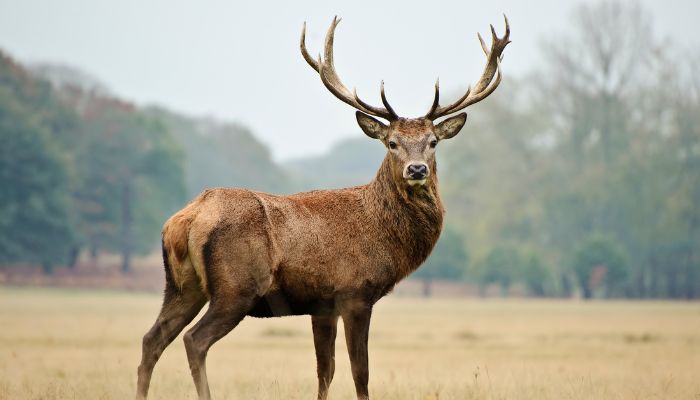Deer hunting is a popular sport that requires a lot of patience, skill, and, of course, the right equipment.
One of the most important tools for successful deer hunting is a good tracking dog.
These dogs are trained to locate and follow the scent of deer, making it much easier for hunters to find their prey. In this article, we will be discussing the 10 best deer tracking dogs.

Table of Contents
Top Breeds for Deer Tracking
For a quick and easy choice, consider these breeds:
- Blackmouth Curs
- Dachsund
- Labrador
- German Shorthaired Pointer
- Bloodhound
- Beagle
- Bavarian Mountain Hound
- Blue Lacy
- Basset Hound
- Blackmouth Cur
For a more detailed understanding, read on to learn what makes these breeds exceptional for deer tracking.
1. Bloodhound
The Bloodhound is a breed that is known for its incredible sense of smell. These dogs are often used by police and search and rescue teams because of their ability to track scents over long distances.
Bloodhounds have a keen sense of smell and an excellent ability to follow a trail, making them a great choice for deer tracking.
2. Coonhound
The Coonhound is another breed that is commonly used for deer tracking. These dogs are known for their ability to track game over rough terrain, making them a great choice for hunters.
Coonhounds have a strong sense of smell and an excellent ability to follow a trail, making them a great choice for deer tracking.
3. Beagle
The Beagle is a small breed that is often used for rabbit hunting, but they can also be used for deer tracking.
These dogs have a strong sense of smell and are known for their ability to follow a trail, making them a great choice for hunters.
Beagles are small, making them easy to carry and transport, which is important for hunters who need to cover a lot of ground.
4. Labrador Retriever
The Labrador Retriever is a popular breed that is known for its intelligence and trainability. These dogs have a strong sense of smell and are often used for hunting and search and rescue work.
Labradors are also known for their ability to work well with humans, making them a great choice for hunters who need a dog that is easy to train and work with.
5. German Shorthaired Pointer
The German Shorthaired Pointer is a breed that is known for its versatility and athleticism. These dogs are often used for hunting and are known for their ability to locate and track game.
German Shorthaired Pointers have a strong sense of smell and are excellent at following a trail, making them a great choice for deer tracking.
6. English Springer Spaniel
The English Springer Spaniel is a breed that is known for its hunting skills. These dogs have a strong sense of smell and are often used for flushing out game.
English Springer Spaniels are also known for their ability to work well with humans, making them a great choice for hunters who need a dog that is easy to train and work with.
7. Weimaraner
The Weimaraner is a breed that is known for its hunting skills and athleticism. These dogs have a strong sense of smell and are excellent at tracking game.
Weimaraners are also known for their ability to work well with humans, making them a great choice for hunters who need a dog that is easy to train and work with.
8. Golden Retriever
The Golden Retriever is a popular breed that is known for its intelligence and trainability. And dog is also known as best blood tracking dogs.
These dogs have a strong sense of smell and are often used for hunting and search and rescue work. Golden Retrievers are also known for their friendly disposition, making them a great choice for hunters who need a dog that is easy to train and work with.
Some question Related to Deer Tracking Dog Breeds
Can you use dogs to track deer?
Yes, dogs can be trained to track deer. Some breeds, such as Bloodhounds, are known for their excellent sense of smell and ability to track scents over long distances, making them well-suited for deer tracking.
However, it is important to note that proper training and experience is required for a dog to effectively track deer.
What to look for in a deer tracking dog
When choosing a deer tracking dog, consider the following factors:
- Sense of smell:
A good deer tracking dog should have a keen sense of smell, as they will need to be able to pick up and follow the scent of a deer. - Drive and determination:
A dog with a high level of drive and determination is necessary for staying focused on the task at hand, even when tracking becomes difficult. - Physical ability:
Tracking a deer can be physically demanding, so it’s important to choose a breed with good endurance and agility. - Trainability:
The dog should be trainable and receptive to learning new skills. - Size and temperament:
The size and temperament of the dog should also be taken into consideration, as a larger dog may be more difficult to handle in dense brush, while a dog with a calm temperament may be better suited for extended tracking sessions.
It’s important to note that not all dogs are suited for deer tracking, and it’s essential to choose a breed that fits your specific needs and goals.
How long after a deer is shot can a dog track it
The length of time after a deer is shot that a dog can track it can vary depending on several factors, including the weather conditions, the type of terrain, and the dog’s training and experience.
In general, the fresher the scent, the easier it is for a dog to track. If the scent is only a few hours old, a well-trained dog can usually track the deer with relative ease.
As time passes, the scent becomes more dispersed and harder for the dog to detect, which can make the tracking more difficult.
In some cases, it may be possible for a dog to track a deer up to 24 hours after it has been shot, but this will depend on the individual circumstances and the dog’s ability to pick up and follow the scent.
Ultimately, the best way to ensure a successful tracking effort is to have a well-trained dog and to start the tracking process as soon as possible after the deer has been shot.
How do you train a dog to track deer
Training a dog to track deer involves a combination of basic obedience training and scent tracking exercises.
Here is a general outline of the steps involved in training a dog to track deer:
- Obedience training: Start by training your dog basic obedience commands such as sit, stay, come, and heel. This will lay a foundation for more advanced tracking training.
- Scent introduction: Introduce your dog to the scent of deer, either by using a commercial scent or by using a piece of deer hide. Allow your dog to sniff the scent and get familiar with it.
- Scent trailing: Start with a simple scent trail, using a small amount of deer scent on a piece of string or rope. Allow your dog to follow the scent, gradually making the trail longer and more challenging.
- Training with live animals: When your dog has mastered scent trailing, start training with live animals. Have a deer or another animal leave a scent trail and allow your dog to follow it.
- Field training: Once your dog has mastered the basics of scent tracking, begin field training, taking your dog out into the wilderness to track deer in their natural environment.
- Continuing education: Regular training sessions will help your dog maintain and improve their tracking skills.
It’s important to note that training a dog to track deer takes time, patience, and consistent effort. Professional training is recommended for those who want to ensure that their dog is properly trained and equipped to track deer effectively.
Can You Use Dogs to Track Deer?
Yes, dogs can be trained to track deer. Their keen sense of smell, combined with proper training, makes them well-suited for the task of tracking deer in the wild.
Certain breeds, such as Bloodhounds, are known for their exceptional sense of smell and ability to track scents over long distances, making them ideal for deer tracking.
However, it’s important to note that training a dog to track deer takes time, patience, and consistent effort, and professional training is recommended for those who want to ensure that their dog is properly trained and equipped to track deer effectively.
What Do Deer-Tracking Dogs Do?
Deer-tracking dogs are trained to follow the scent of a deer and locate the animal. Their keen sense of smell and ability to track scents over long distances make them ideal for this task.
The primary role of deer-tracking dogs is to assist hunters in locating and retrieving wounded or dead deer.
In addition, they can also be used for wildlife research and management, to monitor and track deer populations in specific areas.
The dogs follow the scent trail left by the deer, and once they have located the animal, they can signal the location to their handler.
With proper training and experience, deer-tracking dogs can be highly effective in helping to locate and recover wounded or dead deer in the wild.
Conclusion
Dogs can be trained to track deer, making use of their keen sense of smell and ability to follow scents over long distances.
Breeds such as Bloodhounds are particularly well-suited for deer tracking due to their exceptional scenting abilities.
Training a dog to track deer takes time, patience, and consistent effort, and professional training is recommended for those who want to ensure that their dog is properly equipped for the task.
The primary role of deer-tracking dogs is to assist hunters in locating and retrieving wounded or dead deer, but they can also be used for wildlife research and management. With proper training and experience, deer-tracking dogs can be highly effective in helping to locate and recover wounded or dead deer in the wild.
